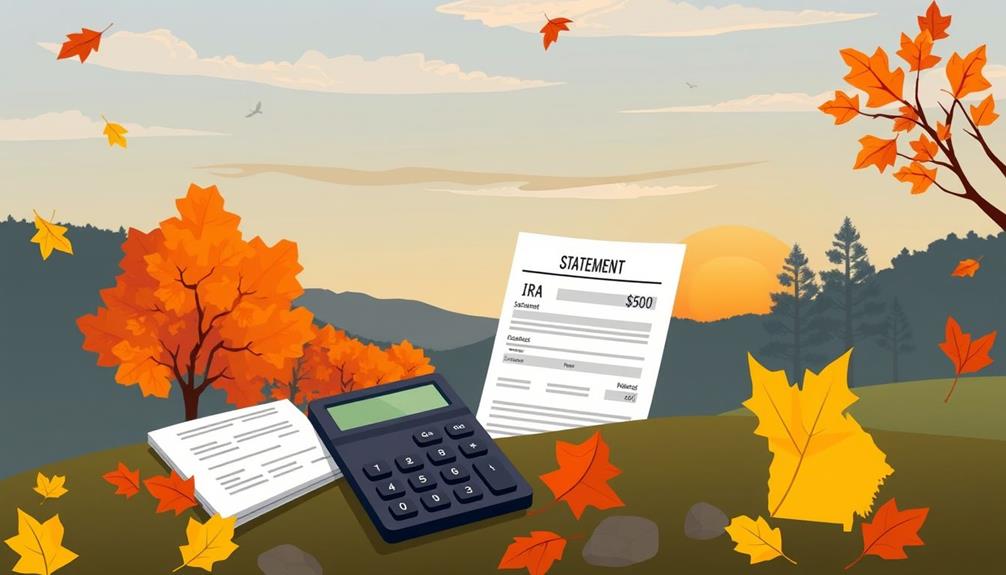Tennessee’s tax environment is very beneficial when it comes to your IRA withdrawals. You will not be subject to any state income tax on these distributions, making your financial planning easier and boosting your retirement savings. Additionally, Social Security benefits are not taxed at the state level. Although property and sales taxes should be considered, the lack of a state income tax makes Tennessee an attractive option for retirees like yourself. It’s important to remember that federal taxes may still apply depending on your total income. By staying with us, you will learn more about effectively managing your retirement finances in Tennessee.
Key Takeaways
- Tennessee has no state-level personal income tax, making IRA withdrawals tax-free at the state level.
- All withdrawal income from IRAs is exempt from state taxation, simplifying financial planning for retirees.
- Federal income taxes may still apply to IRA withdrawals based on the individual's tax bracket.
- Tennessee offers property tax relief programs for eligible seniors and disabled homeowners, aiding financial stability.
- The lack of estate or inheritance tax in Tennessee simplifies financial planning for retirees and their beneficiaries.
Overview of Tennessee Tax Structure

Tennessee's tax structure offers a unique advantage for retirees and individuals looking to manage their investments. One of the most appealing aspects is the absence of a state-level personal income tax. This means that when you make IRA withdrawals, you won't face any state taxation, allowing you to stretch your retirement savings further.
Additionally, Tennessee has a relatively low property tax rate, averaging around 0.67% of assessed value, which ranks 37th in the U.S. for property taxes.
While the state's average combined sales tax rate is 9.55%, including a 7% state sales tax, many find this manageable given the overall tax environment. Significantly, investment income, like that from IRAs, isn't taxed at the state level, especially since the Hall Income Tax on interest and dividends was repealed in 2021.
Furthermore, Social Security benefits are also exempt from state taxation, enhancing the appeal for retirees. With these factors combined, Tennessee presents a favorable tax climate, making it an attractive destination for retirees and those looking to optimize their investment strategies.
Taxation of IRA Withdrawals

When you consider withdrawing from your IRA in Tennessee, you'll find some significant tax benefits.
With no state income tax on these withdrawals, you can access your retirement funds without worrying about additional state liabilities.
This favorable treatment not only simplifies your financial planning but also enhances your overall retirement experience.
Tennessee IRA Withdrawal Rules
For those considering IRA withdrawals in Tennessee, you'll be pleased to know there's no state income tax to worry about. This absence of state tax makes it easier for you to manage your retirement planning.
Since the Hall Income Tax was repealed in 2021, all forms of investment income, including distributions from IRAs, are now tax-free at the state level.
Here are some key points to remember regarding Tennessee IRA withdrawal rules:
- No state income tax on IRA withdrawals.
- Tax-free distributions from both Traditional IRAs and Roth IRAs.
- Federal income taxes may still apply based on your income and tax bracket.
- Tennessee is a retiree-friendly state, enhancing your financial flexibility.
- The lack of state taxation makes retirement savings more attractive.
Tax Benefits for Retirees
With the absence of state income tax on IRA withdrawals in Tennessee, retirees can truly enjoy the financial benefits of their retirement savings. This favorable tax structure means all forms of retirement income, including IRA distributions, aren't taxed at the state level. You'll find that this enhances your financial flexibility, allowing you to maximize your investment potential.
Here's a quick overview of the tax benefits for retirees in Tennessee:
| Feature | Details |
|---|---|
| State Income Tax | None on IRA withdrawals |
| Retirement Income | Untaxed at state level |
| Financial Flexibility | More funds available for use |
| Encouragement to Save | Promotes investment for retirement |
| Simplified Planning | Easier financial management |
Social Security Benefits Taxation

Although taxes can often complicate retirement finances, Tennessee stands out as a state that doesn't impose any state-level taxes on Social Security benefits. This means you can enjoy your retirement income without the burden of state income taxes on your benefits, providing significant tax savings.
Here are some key points to reflect on regarding Social Security benefits in Tennessee:
- Exempt from state taxation: You won't pay state taxes on your Social Security benefits.
- No income limitations: There are no thresholds that could restrict your tax exemption.
- Alignment with retiree-friendly policies: Tennessee promotes savings and investment for retirement.
- Federal taxes may apply: The federal government could tax your benefits based on your overall income.
- Attractive for retirees: The lack of Tennessee taxes on Social Security enhances the state's appeal for retirees seeking financial relief.
Property Tax Considerations

When considering property tax implications, you'll want to understand the rates and assessment processes in your county.
Tennessee's property tax rates can vary considerably, so knowing how your property is assessed can help you plan your finances better.
Additionally, exploring relief options could provide valuable savings, especially if you're eligible for programs aimed at elderly or disabled homeowners.
Property Tax Rates
Maneuvering property tax rates in Tennessee reveals some interesting insights for homeowners. Understanding these rates can help you budget effectively, especially as you shift into retirement.
Here are key points about property taxes in Tennessee:
- The average property tax rate is 0.67% of assessed value, ranking 37th in the U.S.
- Homeowners can expect an average annual tax bill of about $1,259, but this varies considerably across counties.
- Property taxes are assessed based on property value by local tax assessors, leading to different rates in different areas.
- Personal property, including vehicles and boats, isn't taxed, providing savings.
- Tennessee offers a property tax relief program for elderly and disabled homeowners, which includes financial assistance based on income and home value exemptions.
As you evaluate your retirement income taxed in relation to property taxes, consider how these factors will impact your finances.
With the potential for property tax relief, it's essential to stay informed about your assessed value and local tax rates to maximize your benefits as a homeowner.
Assessment Process Overview
Understanding the assessment process for property taxes in Tennessee is essential for homeowners, especially as they plan for retirement. Property taxes are assessed based on your property's market value, which county assessors determine by evaluating real estate in their jurisdictions. This process can greatly impact your overall financial situation, particularly when considering IRA distributions to supplement your income.
In Tennessee, the average effective property tax rate is 0.65%, making it one of the lowest in the U.S. However, property tax rates can vary widely by county, with average tax bills ranging from $463 in Fentress County to $2,588 in Williamson County.
Additionally, personal property like vehicles and boats isn't subject to property taxation, providing further financial relief to residents.
For homeowners aged 65 and older, there's potential for property tax relief if your household income is below $33,460. This could mean a reimbursement or a freeze on your property taxes, helping you manage your expenses as you shift into retirement.
Understanding these nuances can help you navigate state taxes and make informed decisions about your financial future.
Appeals and Relief Options
If you believe your property tax assessment is unfair, you have options for appealing it in Tennessee. The process is straightforward, and resources from the Tennessee Comptroller can guide you through it. Here's what you need to know:
- Assess your property's value compared to local property tax rates.
- File your appeal within the designated time frame set by your county.
- Gather supporting documentation, like recent appraisals or sales data.
- Keep in mind that homeowners with a household income below $33,460 may qualify for property tax relief.
- Check if you're eligible for an exemption, which can reduce your home's assessed value by up to $30,900.
For low-income seniors and disabled homeowners, Tennessee offers specific property tax relief programs. These can provide reimbursements or even freeze your property taxes, easing your financial burden.
Sales Tax Impact on Retirees

Sales tax can greatly affect retirees' budgets, especially in states like Tennessee, where the combined rate averages 9.55%. This higher sales tax can notably influence your monthly expenses, making financial planning vital for managing your retirement funds.
Most groceries are taxed at a lower rate of 4%, but prepared foods and certain items hit the 7% mark, impacting your overall spending on essentials.
Since Tennessee lacks a state income tax, retirees often feel tempted by the idea of more disposable income. However, the state's high sales tax can offset those benefits, making it essential to evaluate your total expenditures.
Additionally, you need to be mindful of the gas tax at 27.4 cents per gallon, which can further add to your living costs.
When budgeting, keep in mind that non-essential goods and services will be taxed at the higher sales tax rate, affecting your purchasing decisions.
Filing Requirements and Deadlines

Maneuvering filing requirements in Tennessee is straightforward, especially since the state has no income tax. This means you won't need to file a state tax return for your IRA withdrawals or any other income.
However, you still need to be aware of federal tax obligations.
Here are key points to keep in mind:
- Federal tax returns are due by April 15, 2024, for income earned in 2023.
- IRA withdrawals may be subject to federal taxation, so keep accurate records.
- Tennessee doesn't impose estate or inheritance tax, simplifying your financial planning.
- Retirees can explore tax relief programs available for low-income seniors, though these don't directly impact IRA withdrawals.
- Always check for any changes in tax laws that may affect your retirement income.
Frequently Asked Questions
Does Tennessee Tax IRA Withdrawals?
No, Tennessee doesn't tax IRA withdrawals. You can withdraw funds without worrying about state income taxes, making it easier for you to manage your retirement income and enjoy your savings without additional state tax burdens.
Do You Pay State Income Tax on IRA Withdrawals?
Imagine a garden where every flower blooms without restraint. In Tennessee, you won't pay state income tax on IRA withdrawals, allowing your retirement savings to flourish freely. Just remember, federal taxes might still apply.
What Is the 9.75% Tax in Tennessee?
In Tennessee, the 9.75% tax is a combined sales tax rate, consisting of a 7% state tax and varying local rates. It applies to most purchases, affecting your everyday spending, but not IRA withdrawals.
What States Require Tax Withholding on IRA Distributions?
Maneuvering through the tax maze, you'll find states like California and New York require withholding on IRA distributions, often taking a slice of your retirement pie. Always check local regulations to avoid unexpected surprises.
Conclusion
In conclusion, understanding state tax implications for IRA withdrawals in Tennessee can help you keep more of your hard-earned money. While you won't face state taxes on your IRA distributions, it's crucial to take into account other factors like Social Security benefits and property taxes. By staying informed and planning ahead, you can make the most of your retirement. Remember, when it comes to taxes, a stitch in time saves nine—taking action now can prevent headaches later!









